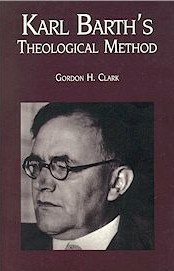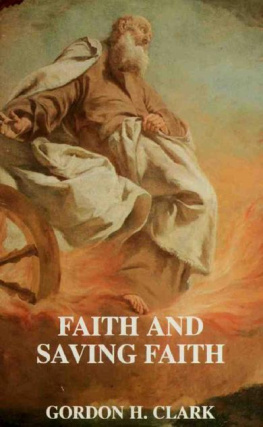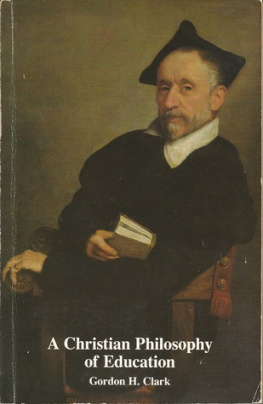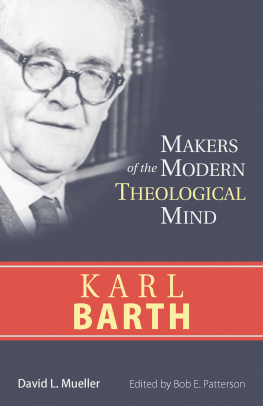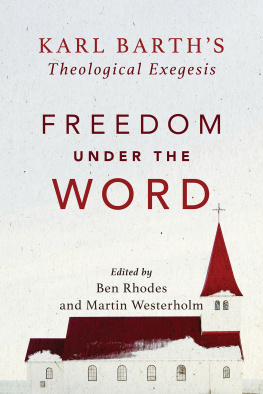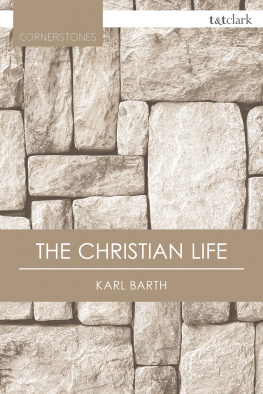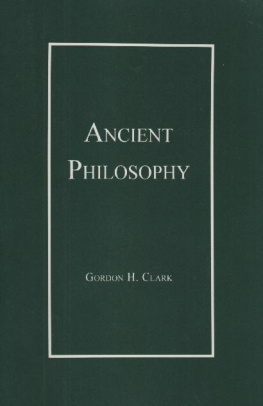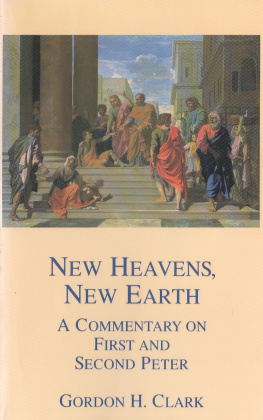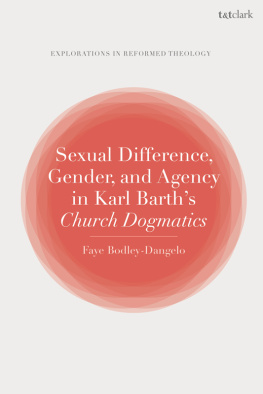Gordon H. Clark - Karl Barths Theological Method (Trinity Papers)
Here you can read online Gordon H. Clark - Karl Barths Theological Method (Trinity Papers) full text of the book (entire story) in english for free. Download pdf and epub, get meaning, cover and reviews about this ebook. year: 1997, publisher: Trinity Foundation, genre: Religion. Description of the work, (preface) as well as reviews are available. Best literature library LitArk.com created for fans of good reading and offers a wide selection of genres:
Romance novel
Science fiction
Adventure
Detective
Science
History
Home and family
Prose
Art
Politics
Computer
Non-fiction
Religion
Business
Children
Humor
Choose a favorite category and find really read worthwhile books. Enjoy immersion in the world of imagination, feel the emotions of the characters or learn something new for yourself, make an fascinating discovery.
- Book:Karl Barths Theological Method (Trinity Papers)
- Author:
- Publisher:Trinity Foundation
- Genre:
- Year:1997
- Rating:4 / 5
- Favourites:Add to favourites
- Your mark:
- 80
- 1
- 2
- 3
- 4
- 5
Karl Barths Theological Method (Trinity Papers): summary, description and annotation
We offer to read an annotation, description, summary or preface (depends on what the author of the book "Karl Barths Theological Method (Trinity Papers)" wrote himself). If you haven't found the necessary information about the book — write in the comments, we will try to find it.
Karl Barths Theological Method (Trinity Papers) — read online for free the complete book (whole text) full work
Below is the text of the book, divided by pages. System saving the place of the last page read, allows you to conveniently read the book "Karl Barths Theological Method (Trinity Papers)" online for free, without having to search again every time where you left off. Put a bookmark, and you can go to the page where you finished reading at any time.
Font size:
Interval:
Bookmark:
THE PRESBYTERIAN AND REFORMED PUBLISHING COMPANY
PHILADELPHIA
PENNSYLVANIA
1963
Copyright 1963
By the Presbyterian and Reformed Publishing Co. Library of Congress Catalog Card Number: 62-12648 Printed in the United States of America
Four Standpoints
A Critics Difficulties
The Word of God
Modernism Exalts Man
Barth Exalts God
The Concept of God
Derivative Doctrines
Barth and Hitler
The Church and the World
The Norm of Logic
Norms Two to Five
Axiomatization
Science, Theology, and the Church
Is Apologetics Possible?
Common Ground
Gods Image to Man
Barths Rationality
Hesitation
An Argument on Dogma
Propositions and Words
Skepticism
The Word of God as Preached
The Written Word of God
The Revealed Word of God
The Unity of the Three Forms
Has God Spoken?
Contemporaneity
Barths Assertion and Denial of Biblical Authority
Barths View of Inspiration
History of the Doctrine
A Functioning Christianity
A Anselm: Fidens Quaerens Intellectum: John Knox Press, 1960
D. C. Deliverance to the Captives: Harper & Brothers, 1961
D. O. Dogmatics in Outline: Philosophical Library, 1949
H. G. The Humanity of God: John Knox Press, 1960
K. G. The Knowledge of God: Charles Scribners Sons, 1939
P. T. Protestant Thought: From Rousseau to Ritschl: Harper & Brothers, 1959
W. G. The Word of God and the Word of Man: The Pilgrim Press, 1928
No symbol: Church Dogmatics: T. & T. Clark, 1936 ff.
Karl Barth is indisputably a theologian of major importance; he may eventually prove to have been the greatest theologian of our era. Helmut Gollwitzer offers this praise: Since the time of the Reformation no evangelical theologian has yet won such attention from the side of Roman Catholic theology as Barth has. His work has created a new situation for Evangelical-Catholic dialogue. The development of the ecumenical movement is as unthinkable without his work as the Christian opposition to National Socialism in Germany, as well as the multiform arrangements of Christians and Churches with communism in the eastern nations .. (Karl Barth: Kirchliche Dog matik, p. 8).
In answer to the opinion that others are already eclipsing him, G. C. Berkouwer wrote, The judgment expressed at various times that its [Barths theology] influence has passed the high water mark is unmistakably being contradicted by the present theological situation (The Triumph of Grace , p. 9). Although this was written before Bultmanns current popularity reached our shores, it is premature to dismiss Barth as a flash in the pan. Barth is a great theologian.
Therefore no critic need now anxiously justify an attempt to study Barths thought. Of course, many others have carefully expounded and criticized his ideas until the public may wonder whether there remains anything further to say. There does. So far insufficient notice has been taken of Barths theological method. Particular points of doctrine, such as the knowledge of God, the Totally Other, the doctrine of Creation, Berkouwers triumph of grace, have been studied at length in books and periodicals; but Barths underlying philosophy, his notion of apologetics, the relation of theology to science, Barths own statements of methodology have received scant attention. To be sure, discussions of specific points of doctrine frequently refer to methods, as also a discussion of methodology inevitably includes some points of doctrine; but no work hitherto published gives the detailed analysis that Barths first volume of Church Dogmatics deserves.
Then, too, regardless of the many excellent studies already published, another one can find its place by virtue of its evaluation and point of view. The present study is indeed an exposition of Barths philosophic orientation, but it is mainly an evaluation. It accepts and it rejects; it aims to correct and improve; it makes bold to offer its own proposals. Accordingly, since evaluations depend on their authors principles, the standpoint of the present work may well be made explicit at the beginning.
Four Standpoints
In the first place a study could be conducted from the standpoint of American fundamentalism. Some ecclesiastics would not appreciate this basis of criticism, but Barth himself might not be completely averse to it. There is a certain reasonableness in viewing Barth from this perspective. For one thing, Barths policy is inclusive: he wants all Christians to take part in theological dialogueand the fundamentalists are Christians, are they not? Then, further, fundamentalism is violently opposed to modernism. Barth is hardly less opposed: he even dares to brand modernism with the horrid name of heresy. The fundamentalists therefore might welcome Barth as an ally. If they have a common enemy, a fundamentalist critique of Barth would doubtless proceed to enquire whether they have any positive doctrines in common. It would of course begin with its customary criteria. Although not all modernists denied the deity of Christ, some did; and a fundamentalist would rejoice to note that Barth, speaking of Jesus and the New Testament phrase, Jesus is Lord, writes, This man is the Jehovah of the Old Testament, is the Creator, is God himself (D.O. p. 85). And on a later page he says again, Jesus Christ is God himself (D.O. pp. 96-97).
Not to mention certain other favorite themes of fundamentalism, such as the vicarious Atonement and the bodily Resurrection of Christ, the Virgin Birth is an item virtually monopolized by the despised fundamentalists these past fifty years. For some reason or other the modernistic tendency, whether or not in individual cases it went so far as to deny the Atonement and the Resurrection, ordinarily began, in American pulpits if not in Europe, with a rejection of the biological miracle of the Virgin Birth. On this point Barth stands firmly, or at least for an Introduction let us say that he seems to stand firmly, with the fundamentalists. He even sees in modernism's rejection of the Virgin Birth one of the several causes of the increasing barbarism, tedium, and insignificance of modern Protestantism (I 1, p. xi).
Barth does not mention the Virgin Birth in any merely incidental way. He devotes a fairly long section to its discussion. (I 2, pp. 172-202). There are some replies to the usual objections: the brevity of the New Testament references is not a good objection because all (two) accounts of Jesus birth and childhood contain it; and if Paul does not mention it, it is because he was mainly explaining the Atonement. Nor can one claim that it is an importation from or imitation of similar stories in Greek mythology. The stories are not similar and the Virgin Birth has no parallels. To disdain it as a biological miracle, as Brunner does, is to forget that the Resurrection is also a biological, or at least a physical and temporal, miracle. If we give up the Virgin Birth, we must also reject the empty tomb. But Barth's main point, which he enforces at length, is that the Virgin Birth is a necessary and essential element of the Incarnation. If we are to understand it, we must see its inward essential rightness. In excluding human paternity it excludes all human initiative and eliminates the last surviving possibility of understanding the vere Deus vere homo intellectually, as an idea or an arbitrary interpretation in the sense of docetic or ebionite Christol ogy. It leaves only the spiritual understanding of the vere Deus vere homo , i.e., the understanding in which God's own work is seen in God's own light (p. 177).
Font size:
Interval:
Bookmark:
Similar books «Karl Barths Theological Method (Trinity Papers)»
Look at similar books to Karl Barths Theological Method (Trinity Papers). We have selected literature similar in name and meaning in the hope of providing readers with more options to find new, interesting, not yet read works.
Discussion, reviews of the book Karl Barths Theological Method (Trinity Papers) and just readers' own opinions. Leave your comments, write what you think about the work, its meaning or the main characters. Specify what exactly you liked and what you didn't like, and why you think so.

